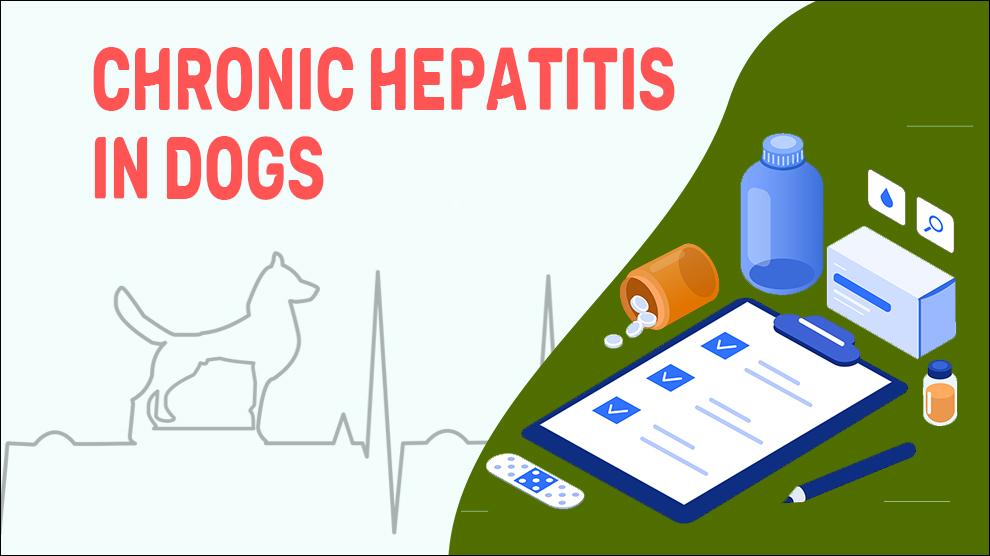Chronic hepatitis, as the name implies, is a chronic liver disease in dogs caused by many different disease processes. Liver inflammation (chronic) is characterized by necrosis or hepatocyte apoptosis, inflammatory cell infiltrates (such as infiltrating macrophages, and T lymphocytes), fibrosis, and regeneration on histopathologic examination.
This is multifactorial nature and several different causes of the disease exist, which all have their own names. Moreover, sometimes other disorders/conditions can occur at the same time as hepatitis, which makes identifying the cause of the symptoms rather difficult.
For instance, Infectious canine hepatitis is caused by the canine adenovirus 1 (CAV-1). This disease has become rare due to widespread dog vaccination programs such as the cross-reacting adenovirus type II vaccine. As such, only young and unvaccinated dogs are at risk of contracting ICH nowadays.
This virus is often confused with other viral infections including tracheobronchitis (i.e., kennel cough) and parvovirus because of the similarity in clinical signs and the organ systems affected. CAV-1 is related antigenically to CAV-2 (one of the causes of kennel cough).
Symptoms Of Chronic Hepatitis
- Apathy
- Anorexia
- Abdominal pain (occasional).
- Conjunctivitis
- Congestion of mucous membranes.
- Distended abdomen
- Discharge from the eyes and nose.
- Enlarged tonsils
- Fever
- Abdominal pain and vomiting
- Excessive thirst
- Excessive urination
- Yellow, jaundiced look to skin, gums, and ears.
Severe Cases:
- Discolored or reddened mouth and nose.
- Red dots on the skin.
- Swelling (head, lymph nodes, neck).
- Slight paralysis
- Seizures
Treatment Options For Chronic Hepatitis
There is no specific treatment available for Canine hepatitis in dogs.
- Broad-spectrum antibiotics are initially started and once cultures and blood tests have been obtained, then the antibiotic choice may be changed.
- For the anorexic, nauseated, and systemically ill dogs, hospitalization for supportive therapy such as intravenous fluids might be required.
- When infectious hepatitis exacerbates immune-mediated complications - corticosteroids (prednisone, prednisolone, dexamethasone, triamcinolone) and other immunomodulating medications (such as Cyclosporine (CSA), Azathioprine, Mycophenolate mofetil) are provided.
- Partial hepatectomy surgery or laparoscopic resection - for any large lesions.
Home Remedies For Chronic Hepatitis
- Adjunctively to standard therapy, Liver supplements are often used for cholangiohepatitis and these include silybin, S-adenosylmethionine (Sam E), milk thistle, and glutathione.
- Ursodiol (Ursodeoxycholic acid) use is better established in dogs. It is a naturally occurring bile acid that improves flow through diseased bile ducts and helps reduce the viscosity of bile.
- Make sure that your dog gets appropriate vaccinations.
Prevention Of Chronic Hepatitis
- Prevention of Chronic hepatitis can be done only by preventing underlying causes. Pet owners should discuss how to prevent the possibility of liver disorders with their vet.
- Modified-live virus (MLV) injectable vaccines are highly effective for infectious canine hepatitis.
In addition to the canine distemper vaccinations, your dog will usually receive Attenuated CAV-1 vaccines.
Vaccinations are started in puppies ages 6 - 8 weeks.
Live attenuated CAV-1 vaccines have produced transient corneal opacities or uveitis and the virus may be shed in the urine.
As a result, CAV-2 attenuated live virus strains are preferentially used, which provide cross-protection against CAV-1.
Affected Breeds Of Chronic Hepatitis
Bedlington Terrier, Labrador Retriever, Cocker Spaniel, Doberman Pinscher, Skye Terrier, Standard Poodle, Springer Spaniel, Chihuahua, Maltese, West Highland White Terrier, Beagle
Additional Facts For Chronic Hepatitis
- Causes of Chronic Hepatitis:
Infectious:
- Canine Adenovirus 1 (CAV-1).
- Heliobacter sp
- Herpesvirus
- Leptospirosis
Drugs:
- Carprofen
- Amiodarone
- Phenobarbitol
- Diethylcarbamazine - Oxibendazole
- Trimethoprim / Sulfadiazine
Hereditary:
- Alpha - 1 - Proteinase inhibitor deficiency.
Other disease / Condition:
- Copper Hepatotoxicosis
- Autoimmune Mechanisms
- Repeated Acute Hepatitis
- Various Toxicities
- Mortality:
- One of the common causes of morbidity and mortality in dogs is liver problems.
- Young dogs have the highest mortality rate (usually it ranges from 10% to 30%).
- Diagnosis:
- CT scan and MRI
- Histopathological examination using hematoxylin-eosin staining.
- Immunohistochemical examination
- Liver biopsy
- Prognosis:
Acute hepatitis has a good prognosis when diagnosed early; however, chronic hepatitis cannot be cured. An appropriate diagnosis of this disease is always best left to your vet to make sure that it is not progressing into a serious form.
Dogs affected with multiple organ diseases have significantly shorter survival times if left untreated. However, as chronic hepatitis is slowly progressive, dogs can survive several years after initial diagnosis even without therapeutic interventions.
When To See A Vet
Contact your vet right away, if you notice any of the following:
- Yellow, jaundiced look to skin, gums, and ears.
- Swollen lymph nodes, neck, belly, and head.
When you see visible signs of liver disease in your dogs, it’s clear that the condition has progressed to a developed stage.
A definitive diagnosis can be done by taking a liver biopsy to determine the type and severity of the liver disease.
Food Suggestions For Chronic Hepatitis
- Leafy greens and fresh vegetables (A big ‘NO’ to dry foods).
- Protein (moderate levels of bioavailable protein).
- Stick to smaller, tasty meals (feed him 4-5 times a day).
- Add safe dairy products (cottage cheese, ricotta cheese and yogurt).
- Omega fats (omega-6 and omega-3 in a 4:1 ratio) and antioxidants.
- Avoid foods high in copper (organ meats).
- Low in Phosphorus (0.2% - 1% dry matter) appropriately formulated fresh food diet.
- Regulated treats that are part of the daily calorie intake.
Conclusion
As Chronic hepatitis is not a sign and disease in itself, treatment will depend on the predisposing cause.
Regular follow-up appointments with your veterinarian are essential as recovery would be slow. Always follow the progress and adjustment of the drugs or treatment techniques as necessary.

















